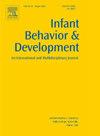驾驭口音变异:24 个月大的幼儿能识别以陌生口音说出的已知单词,但学习新单词时需要额外的支持。
IF 1.9
3区 心理学
Q3 PSYCHOLOGY, DEVELOPMENTAL
引用次数: 0
摘要
在婴儿学习母语的过程中,他们还必须学会应对不同语言使用者之间的差异。在此,我们研究了 24 个月大的婴儿处理陌生口音语音的能力。我们的研究表明,24 个月大的幼儿能成功识别陌生口音语音中已知单词的所指,但却不能单独使用已知单词来推断新单词的含义。然而,当新词出现在支持性的指代语境中,目标指代可以直观地看到时,24 个月大的幼儿就能成功地学习新词-指代映射。因此,24 个月大的幼儿能识别和学习陌生口音的单词,但陌生口音的语音可能会对更复杂的语言处理策略构成挑战。本文章由计算机程序翻译,如有差异,请以英文原文为准。
Navigating accent variability: 24-month-olds recognize known words spoken in an unfamiliar accent but require additional support to learn new words
As infants learn their native languages, they must also learn to contend with variability across speakers of those languages. Here, we examine 24-month-olds’ ability to process speech in an unfamiliar accent. We demonstrate that 24-month-olds successfully identify the referents of known words in unfamiliar-accented speech but cannot use known words alone to infer new word meanings. However, when the novel word occurs in a supportive referential context, with the target referent visually available, 24-month-olds successfully learn new word-referent mappings. Thus, 24-month-olds recognize and learn words in unfamiliar accents, but unfamiliar-accented speech may pose challenges for more sophisticated language processing strategies.
求助全文
通过发布文献求助,成功后即可免费获取论文全文。
去求助
来源期刊

Infant Behavior & Development
PSYCHOLOGY, DEVELOPMENTAL-
CiteScore
4.10
自引率
4.80%
发文量
94
期刊介绍:
Infant Behavior & Development publishes empirical (fundamental and clinical), theoretical, methodological and review papers. Brief reports dealing with behavioral development during infancy (up to 3 years) will also be considered. Papers of an inter- and multidisciplinary nature, for example neuroscience, non-linear dynamics and modelling approaches, are particularly encouraged. Areas covered by the journal include cognitive development, emotional development, perception, perception-action coupling, motor development and socialisation.
 求助内容:
求助内容: 应助结果提醒方式:
应助结果提醒方式:


